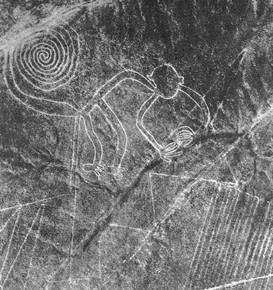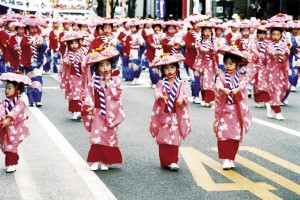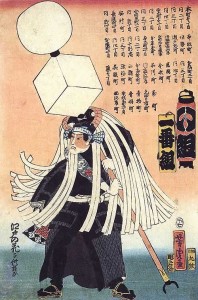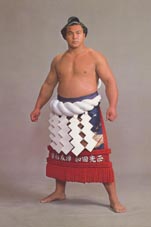Hey what’s up everybody?
Today I’ll introduce Peru’s traditional culture. Do you know Lines and Geoglyphs of Nasca and Pampas de Jumana In Japanese, they are Nasca no Chijoue, in English the Nasca Lines
Some picture like a bird, plane, monkey, were written by someone in the earth in the Nasca desert.
Maybe a lot of people thinking that Picture are called Nasca. But that’s wrong. The correct name is ”Líneas y geoglifos de Nazca y de Pampas de Jumana”
Nobody knows who, when or why they were written, This is the big mystery of the Nasca Lines.
A lot of people is researching but still is mystery. Cool!
Peru’s Traditional Culture
May 28th, 2008the Star Festival
May 28th, 2008I introduce about the Star Festival.
Almost all Japanese festival are lively. But, this festival is quiet and calm.
This festival is held without Japanese drums or Japanese flutes. We hold just to desire our wishes.
It has legend that Altair can meet to Vega on 7th July once a year as they cross the Galaxy. But if it rains or is cloudy they can’t meet. So we hope the weather is good and Altair can meet Vega.
Then we write our wishes on paper cards. And we put them on frouds.
We wish on Altair and Vega. This festival is so romantic.
Hakata DONTAKU
May 27th, 2008Do you know “Dontaku”?
Dontaku is one of the famous festivals in Japan. It takes place in Hakata ward of Fukuoka prefecture. It is held for Golden week every year.
Dontaku is originally from “Zontag”. “Zontag” means holiday in Dutch.
Many cultures gather (Okinawa, Awa and so on) in Dontaku, and there are a lot of events. We can enjoy dancing and wearing a special custom and seeing flower decorated cars. Some are playing the shamisen or beating drums, others clapping wooden spoons for scoping rice.
We can see many people there. Two and million half people came to Dontaku this year.
People believe that we had a lot of rain on Dontaku, but it was sunny this year.
Are you interested in Dontaku?
See you…
Old love cultures :)
May 27th, 2008Today, I would like to tell you about old love cultures! I’m really interesting in the Edo period ! because I took an amazing Japanese history class.There are lots of funny cultures.
In the Edo period, a monk, hikeshi(kind of fireman) and Sumo wrestler is the most populer jobs for guys because they can get a lot of attention from women 😉 If you associated with a monk, it’s like you’re a student and are seeing a teacher. It was against the rule, but also there are lots of thrill;D LOL I hered that monk play around with women still now  In this time the women could’n t see sumo games so they admired the wrestler. And people also thought Hikeshi is cool because they looks strong and fashionable.
In this time the women could’n t see sumo games so they admired the wrestler. And people also thought Hikeshi is cool because they looks strong and fashionable.
Take care
Megumi
my culture
May 27th, 2008January 1th, this is new years day. People all of the world celebrate this day. In japan, most of people gose to temple to pray their hope and say a target of one year.
In my family, we have been to “Taishakuten” since I was a baby. Tishakuten is very old temple. it is at sibamata. In there, iI pray “please geive me a good year, too.” and drow a written fortune. I drew good luck this year. After that, I eat dinner with my family, grandparents,uncle, aunt and cousin at grandparent house. Menu of dinner is “Osechi” and “Ozouni” . My grandmother is good cooker. So it is very good. After dinner, I give new years gift and play “shakuninn-isshu”. It is card game that be passed down from past and very exciting game. I like it . but I’m not good at it. In this way , my family spend on new years day. I’m looking forward to next this day.
My Culture
May 26th, 2008Bowing is a Japanese traditional custom. I really like it because it is useful and pleasant when someone bows to me. I think bow has many meaning in each situation. For example, when we are greeting, it means “nice to meet you”, when we bow for boss or elder people, it means “respect” and in sports, we also often bow, we bow for “acclaim” each other. I like this way the most. In soccer game we bow each other before and after the game, before the game, bow means “nice to meet you and has a good game” and after the game, it means “good game and thank you”. Some team players often bow for field too, before they go in to the field, it means “please keep an eye on our game”. Bow is really casual custom but really polite. I feel pride about it.
Festival
May 26th, 2008Have you ever joined japanese festival ? I have joined it many times ,festival is very fun .
japanese festival has many kind of type. But I think japanese festival can divide two type .Japanese fesival has two type, so “mikoshi” and “dashi”. Mikoshi means carry on The Buddha’s house by many people. Dashi means pushing big a wheel in many kind of musician by many people.
My festival type is dashi. I weared speciai costume . For example ,tabi is old type footwear and obi means your waist to hold up your clothes and decoration .
And I show special dance for people. Then people give moneys for showers. This money is management money or we use drinking and eating.
Laos Culture
May 22nd, 2008In Laos, there are many festivals every year. The biggest festival, and everybody is waitting for, is called SONG KARN (water festival).
The festival lasts three days. The first of the three days is the last day of the old year. Houses and villages are cleaned properly on the first day. Perfume, water and flowers are also prepared for the Lao New Year. Water is used for washing homes, Buddha images, monks, and soaking friends and passers by. Students first repectfully pour water on their elders, teachers, then monks for their blessings for peace long life, and last of all they throw water to each other. The water is perfumed with flowers or natural perfumes. Some people prefer flowers in the water to give a pleasant smell, as well as adding perfume. Many people enjoy soaking water on Buddha images at the temple. Parents prepare traditional food such as: fried chicken, bamboo soup, green papaya salad and beer (beer lao). So most people in Laos enjoy having the traditional food, beer, soaking each other and passers by with water.
Projects – Lesson 6
May 21st, 2008Today we decided that teams should have four weeks to complete their podcast shows. The shows should be:
- 8~10 minutes long
- be interesting for students
- be connected to Oberlin
- be varied and contain 3 elements (interview, survey etc)
- have a worksheet to teach new words and give listening practice for classmates
- have jingles and an Intro / Line-up and Goodbye
The second mini-task was to write a 100~150 word blog post on podpress.com on ‘My Culture’. This is homework and should be finished before next week’s lesson.
Have fun and work hard!
Student Pods – Lesson 5 – Naoki Z and Yuuta
May 14th, 2008Yuuta is kept waiting when Naoki has a problem with the bus…






